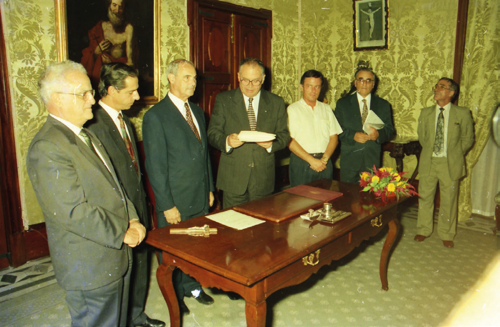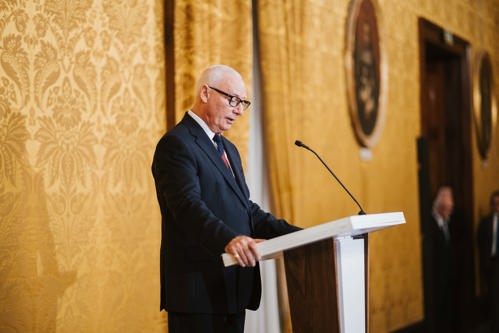The Office of the Parliamentary Ombudsman of Malta: Thirty years of service
Date of article: 18/11/2025
Daily News of: 18/11/2025
Country:  Malta
Malta
Author: National Ombudsman of Malta
Article language: en
Introduction
The Office of the Ombudsman was established following the enactment of the Ombudsman Act by the House of Representatives, which received the assent of the President of Malta on the 21 July 1995, and became effective of the 15 November 1995. The constitution of the Office marked a positive development towards further democratic governance in the administration of public services, where persons could seek redress for free from an independent and impartial institution.
As its primary mandate, the Office was intended to investigate grievances regarding acts or omissions of Government including decisions taken and practices applied by the public service and the public administration, and to recommend redress when injustice is determined. Yet to describe the Ombudsman simply as a complaint-handling office would be to diminish its true purpose as the Office stands for the promotion of real fairness in the administration of public governance, a bridge-building mechanism between the State and people, and overseer and catalyst of change for the better in the operations of Government.
The First Ombudsman
The first Parliamentary Ombudsman of Malta, Mr Joseph Sammut, was appointed following a unanimous resolution of the House of Representatives on the 31st July 1995.
In his published reflections “Serving People and Parliament: The Ombudsman Institution” of 2020, Mr Sammut described the early days of the Office as “an instant success. Citizens having genuine grievances against the public administration could now resort to this new mechanism for ‘soft’ justice without the need of political intervention to back their claims.”

Mr Joseph Sammut taking the oath of office before the President of Malta H.E. Dr Ugo Mifsud Bonnici, in the presence of the Speaker of the House of Representatives, Hon. Dr. Lawrence Gonzo, the Prime Minister of Malta, Hon. Dr Eddie Fenech Adami and the Leader of the Opposition, Hon. Dr. Alfred Sant.
A graduate in economics and public administration, Mr Sammut served in Malta’s civil service for more than four decades, including as Head of the Civil Service and Secretary to the Cabinet. His deep understanding of government operations and commitment to public service ethics shaped the foundations of the Ombudsman institution. He led the Office for two full terms between 1995 and 2005, during which the Office established its credibility, independence, and moral authority.
The First Complaint
The first written complaint was investigated on the 22 November 1995. The complaint was lodged by Dr José Herrera, on behalf of a client, claiming money due by virtue of the Staff Savings Scheme of the now-defunct International Aeradio Limited. The case was investigated by Dr Brian Said, who at the time served as one of the Office’s first Investigating Officers and who today is the Head of Investigations of the Office of the Ombudsman.

Case No 1 - The complaint file of the first case to be investigated
Regarding the subject-matter in question, the Department of Civil Aviation, responsible to answer at the time, had directed the complainant to submit his greviance to the Commission for the Investigation of Injustices (Kummissjoni għall-Investigazzjoni ta’ Inġustizzji). When the Ombudsman Act came into force, the complaint was formally received for review.
In his final opinion, the Ombudsman, Mr Joseph Sammut, noted that the events in question had taken place between 1973 and 1979. Since the Ombudsman may only investigate matters that occurred within the six months preceding a complaint, the case fell outside his jurisdiction.
Despite this limitation, he still examined the grievance and confirmed that the Government had acted in line with the recommendation issued in 1991 by the Commission for the Investigation of Injustices, which had been applied only to those employees who had submitted their claims within the legal time limits.
The complainant had not filed a claim within the prescribed period and therefore was not eligible for the compensation that had been granted to others.
While expressing understanding for the complainant’s position, the Ombudsman concluded that the authorities had acted according to law and that no maladministration or improper discrimination had occurred.
The raison d`etre
A crucial benefit for the existence of the Office is that when it investigates, it does not take sides but asks questions to get answers. The Office investigates the administrative modus operandi of public bodies and will not hesitate the least to say when unfairness is perpetrated or people are treated poorly. The Office provides a space that is safe because information that the Office gathers is secret, privileged and not subject to scrutiny by any court or tribunal. The Office is also impartial and neutral founded on a non-adversarial approach and procedure that, unlike the courts, makes it more user friendly. That is the core reason why the Office was designed not only in Malta but practically everywhere in the world not to impart executive orders but make recommendations, not for public bodies to ignore, reject or discard, but plainly and simply to put things right.
The numbers

Over the past three decades, the Office of the Ombudsman received written 18,060 complaints from persons seeking fairness, transparency and accountability in matters of administration of Government. An equally important number of 14,473 persons sought guidance or informal assistance from the Office highlighting over the span of time the ever-growing reputation as an accessible and trusted source of help.
The intervention of the Office has led to important reforms in public administration, improved service delivery, and greater respect for the rights of persons. The figures stand as tangible evidence that independent and impartial oversight does not hinder but strengthens public governance.
A consistent, fresh and evolving institution
Over time, the Office of the Ombudsman continued to evolve to meet challenging scenarios.
2007 - The Office of the Ombudsman became a constitutional office, sealing its proven independence: a milestone in recognition of its past, an acknowledgement of the present, and a foundation for the future.
2012 - Independent Commissioners for Administrative Investigations were integrated within the Office, in order to extend the reach of the Office in matters of specialised interest in the administration of public affairs. The Ombudman Act was amended in 2012 to address this positive innovation, and a specific legal notice was approved to regulate their operations. Three Commissioners were appointed: Health, Environment and Planning, and Education.
2020 - The Office of the Ombudsman was further entrenched and reinforced in the Constitution.
Looking Ahead

The Parliamentary Ombudsman of Malta, Judge Joseph Zammit McKeon, addressing the 30th Anniversary official commemoration in the Throne Room of the Palace of the President of Malta in Valletta
In the presence of H.E., the President of Malta, Notary Myriam Spiteri Debono, the Parliamentary Ombudsman of Malta stated as follows:
“The strength of the institution is its proven independence, standing to be counted whenever necessary. The Office has made a significant difference in the lives of people, and this was made possible through the trust of all stakeholders.”
The Office will continue to serve with integrity, fairness, and transparency, guided by the same principles that inspired its creation.
Judge Zammit McKeon insisted:
“As we celebrate the past and present of the institution, we look with serenity towards the future with a renewed sense of purpose. The trust and support of the public inspire us to continue striving for better oversight. With that trust comes great responsibility, and we reaffirm our commitment to justify the confidence placed in us.”
Insisting on fairness
The Office of the Ombudsman remains what it was always meant to be: a guardian of good public governance and a voice for real justice. Its founding principle endures : no person should suffer injustice without a remedy and no act or omission in the administration of public affairs should stand beyond scrutiny.
As it enters its fourth decade, the institution looks attentively ahead with renewed confidence, adapting to new and fast challenges, embracing innovation and keeping steadfastly true to its mission in the promotion and protection of administrative justice, fairness and of the rights of all persons without distinction.
